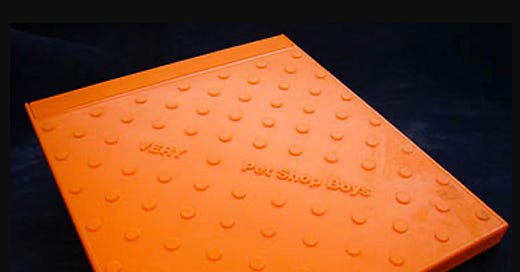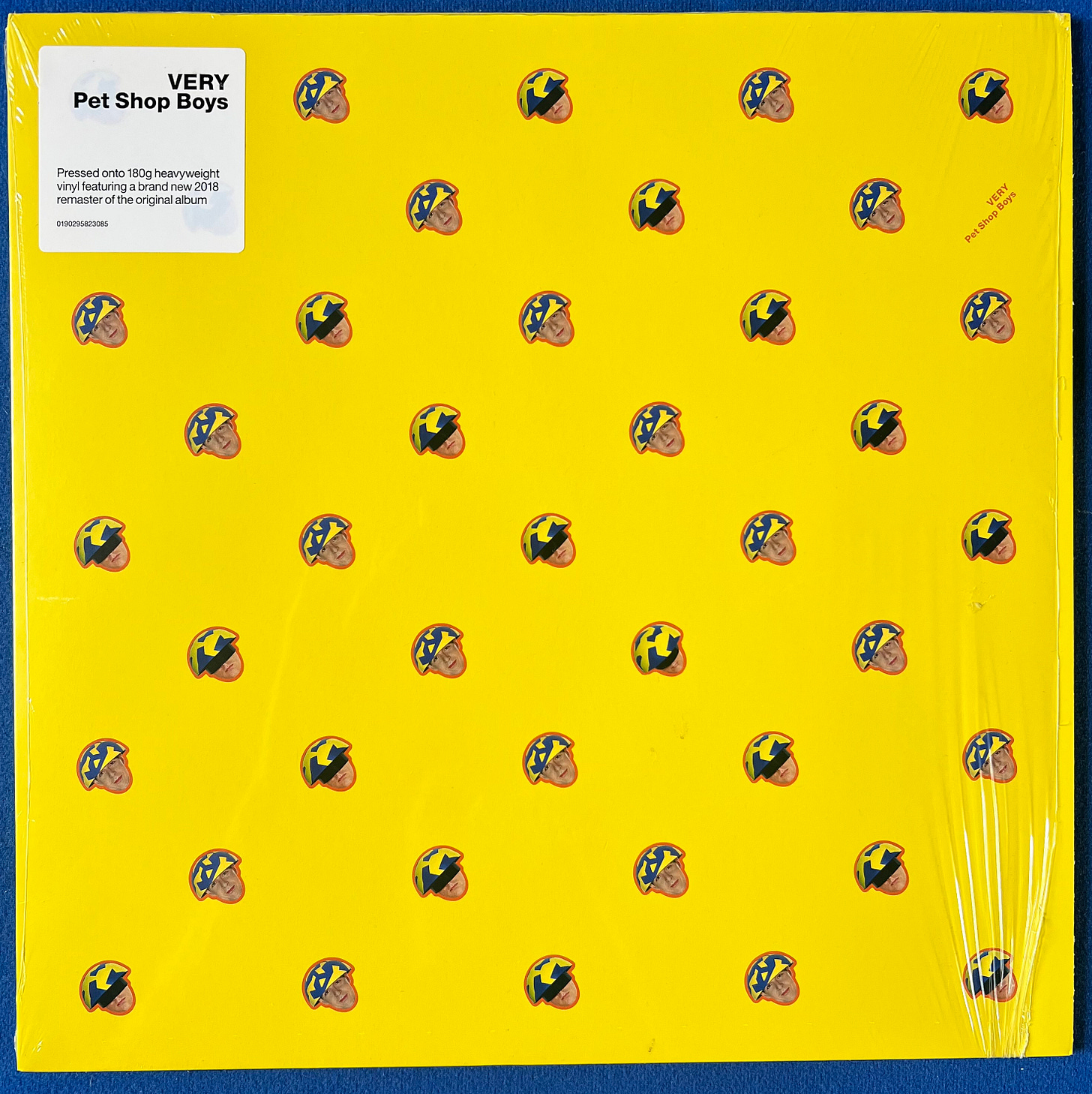Classic album: Very, Pet Shop Boys, is 30 years old.
Their no.1 album from 1993 is 30 years old. Yikes.
Neil Tennant has observed that ‘This album is better than you think.’ In light of it being a no.1 album with 5 singles and brimming with more songs than a Prince boxset it’s unclear how it can be better, but he adds. ‘It's superficially a shiny pop album but, in fact, beneath that shiny exterior, is quite a lot of depth and, as ever with Pet Shop Boys, angst.’
With its bright orange ‘lego’ CD case and early CGI videos for the singles, it was certainly their shiniest album. Even song titles such as I wouldn’t normally do this kind of thing bouncing around a jaunty piano, giddy in love, and at such odds to the previous album’s reflections upon school days in the rain that they sounded like a different band. So much for all their songs sounding the same.
From the grime and the sleaze, from the stars falling to the gutter and the sway of strangers' overcoats hurrying on home, 1993 found Pet Shop Boys as shiny and pop and pert as they were ever going to be. There was something almost monstrous at how out of step they were with the self-pity and angst of grunge and dull MTV unplugged albums and Boys 11 Men giving way to Boyzones. Reunited with muse Stephen Hague, their 5th album arrived in a blur of hyper-promotional activity.
From the autumnal shades of 1990’s Behaviour album, and sustained flirtations with the music hall and theatre, aided by the fading propulsion of their Imperial phase, Very found Tennant and Lowe finding a seemingly bottomless drawer of tunes, and a desire to present themselves as artificial objects d’art. It arrived in follow up to the peerless Discography, their singles collection, none of which sounded anything like the electronic crunching riff of irrepressible horn stabs of lead single Can you forgive her? announcing their return. It’s hard to capture how exciting and triumphant this single was, leading you behind the bicycle sheds, it bleeped and rippled with barely restrained menace, and reacquainted them with the singles top 10 amongst Snap, 2unlimited and Haddaway.
It was followed by the all-conquering Go West, Neil overcoming his horror at Lowe’s suggestion they cover it for a one-off Hacienda gig in Manchester, they enrolled arranger Richard Niles to assemble a Broadway choir. With Tennant and Lowe writing a new coda and bridge, and enhancing the chord progression from Pachelbel’s Canon, there wasn’t a kitchen sink left that hadn’t been thrown into the mix. It’s become an unrepresentative camp calling card of a band equally at home in the alleyways as the podiums and now Arsenal terraces. It treads a tightrope and with overplaying falls on the cheesy side, but top marks for trying.
Reclaiming their cool finds the shimmering synths of arcades and potentially wasted youth in Young offender: a driving an electro-bleepy-pop masterpiece with Tessa Niles on backing vocals. Meanwhile, the sweeping romance of Liberation - with its JJ Belle wah-wah guitar sounding like a survivor from the Behaviour era - we're driven home in a taxi to who knows what abandon. Such a tender and dreamy pop song, cut from the same cloth of similarly underperforming (in the charts) as 1990’s Being boring, had its work cut out as single; even its b-side Decadence was another high tide mark of quality B-sides.
Elsewhere on Very there's a peep around the potential of Take That singing the soaring pop of One in a million (partly written in 1984), and the hypnotic boldness, stomping house piano, and football chants of One and one make five. Meanwhile Dreaming of the Queen stakes a claim for their finest ballad, as heartbreaking and as colossal as 1987’s It couldn't happen here. Its wide-screen strings of Anne Dudley underpins a sweeping sadness and muted horns ushering in the hushed plaintive ‘there are no more lovers left alive’; its effects and soundscape flourishes marked new notches on their ambition. Remarkably, snapping at its heels is The theatre, growing hymn-like over its 5 minutes, with added choir, challenges for the same territory on the same album!
The furtive sexuality of To speak is a sin, already having waited 10 years in the wings of unrecorded songs, captured the thrill and danger of hooking up in a city as a gay man, yet the run-down dive bars were already gone, while Yesterday, when I was mad survives novelty accusations with its overwhelmingly manic enthusiasm.
Very is the last truly perfect PSB album. Through Please, Actually , Introspective, Results (yes, we’re counting that, as the prequel to Behaviour sung by Liza Minelli), and this they were infallible. On Very there is no dud, not flaws and no shame. It's as shameless as the finest b-side of the era proclaimed. It was effortless pop where you can hear the effortful care and attention. After 1993, it wasn’t their songwriting that crumpled, but their ability to choose what tracks to put on albums. Subsequently, as they so wished, with such romance, wistfulness, hope and wry humour it is Very Pet Shop Boys and is probably their masterpiece.





